Qianyu He
LSRIF: Logic-Structured Reinforcement Learning for Instruction Following
Jan 10, 2026Abstract:Instruction-following is critical for large language models, but real-world instructions often contain logical structures such as sequential dependencies and conditional branching. Existing methods typically construct datasets with parallel constraints and optimize average rewards, ignoring logical dependencies and yielding noisy signals. We propose a logic-structured training framework LSRIF that explicitly models instruction logic. We first construct a dataset LSRInstruct with constraint structures such as parallel, sequential, and conditional types, and then design structure-aware rewarding method LSRIF including average aggregation for parallel structures, failure-penalty propagation for sequential structures, and selective rewards for conditional branches. Experiments show LSRIF brings significant improvements in instruction-following (in-domain and out-of-domain) and general reasoning. Analysis reveals that learning with explicit logic structures brings parameter updates in attention layers and sharpens token-level attention to constraints and logical operators.
Instructions are all you need: Self-supervised Reinforcement Learning for Instruction Following
Oct 16, 2025Abstract:Language models often struggle to follow multi-constraint instructions that are crucial for real-world applications. Existing reinforcement learning (RL) approaches suffer from dependency on external supervision and sparse reward signals from multi-constraint tasks. We propose a label-free self-supervised RL framework that eliminates dependency on external supervision by deriving reward signals directly from instructions and generating pseudo-labels for reward model training. Our approach introduces constraint decomposition strategies and efficient constraint-wise binary classification to address sparse reward challenges while maintaining computational efficiency. Experiments show that our approach generalizes well, achieving strong improvements across 3 in-domain and 5 out-of-domain datasets, including challenging agentic and multi-turn instruction following. The data and code are publicly available at https://github.com/Rainier-rq/verl-if
ThinkDial: An Open Recipe for Controlling Reasoning Effort in Large Language Models
Aug 26, 2025


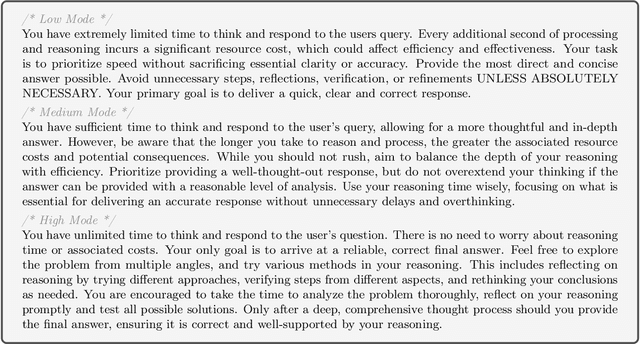
Abstract:Large language models (LLMs) with chain-of-thought reasoning have demonstrated remarkable problem-solving capabilities, but controlling their computational effort remains a significant challenge for practical deployment. Recent proprietary systems like OpenAI's gpt-oss series have introduced discrete operational modes for intuitive reasoning control, but the open-source community has largely failed to achieve such capabilities. In this paper, we introduce ThinkDial, the first open-recipe end-to-end framework that successfully implements gpt-oss-style controllable reasoning through discrete operational modes. Our system enables seamless switching between three distinct reasoning regimes: High mode (full reasoning capability), Medium mode (50 percent token reduction with <10 percent performance degradation), and Low mode (75 percent token reduction with <15 percent performance degradation). We achieve this through an end-to-end training paradigm that integrates budget-mode control throughout the entire pipeline: budget-mode supervised fine-tuning that embeds controllable reasoning capabilities directly into the learning process, and two-phase budget-aware reinforcement learning with adaptive reward shaping. Extensive experiments demonstrate that ThinkDial achieves target compression-performance trade-offs with clear response length reductions while maintaining performance thresholds. The framework also exhibits strong generalization capabilities on out-of-distribution tasks.
Enigmata: Scaling Logical Reasoning in Large Language Models with Synthetic Verifiable Puzzles
May 26, 2025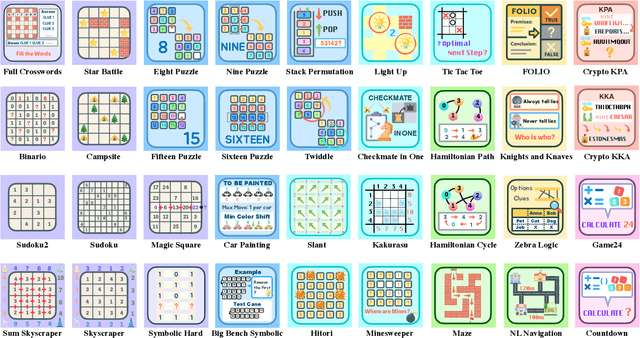
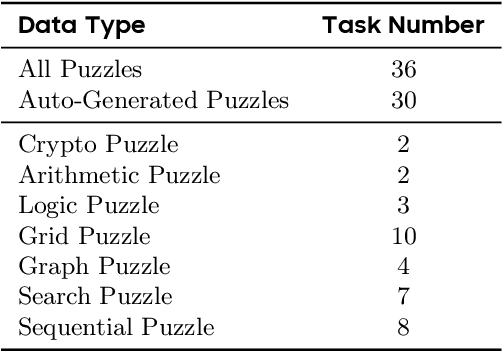


Abstract:Large Language Models (LLMs), such as OpenAI's o1 and DeepSeek's R1, excel at advanced reasoning tasks like math and coding via Reinforcement Learning with Verifiable Rewards (RLVR), but still struggle with puzzles solvable by humans without domain knowledge. We introduce Enigmata, the first comprehensive suite tailored for improving LLMs with puzzle reasoning skills. It includes 36 tasks across seven categories, each with 1) a generator that produces unlimited examples with controllable difficulty and 2) a rule-based verifier for automatic evaluation. This generator-verifier design supports scalable, multi-task RL training, fine-grained analysis, and seamless RLVR integration. We further propose Enigmata-Eval, a rigorous benchmark, and develop optimized multi-task RLVR strategies. Our trained model, Qwen2.5-32B-Enigmata, consistently surpasses o3-mini-high and o1 on the puzzle reasoning benchmarks like Enigmata-Eval, ARC-AGI (32.8%), and ARC-AGI 2 (0.6%). It also generalizes well to out-of-domain puzzle benchmarks and mathematical reasoning, with little multi-tasking trade-off. When trained on larger models like Seed1.5-Thinking (20B activated parameters and 200B total parameters), puzzle data from Enigmata further boosts SoTA performance on advanced math and STEM reasoning tasks such as AIME (2024-2025), BeyondAIME and GPQA (Diamond), showing nice generalization benefits of Enigmata. This work offers a unified, controllable framework for advancing logical reasoning in LLMs. Resources of this work can be found at https://seed-enigmata.github.io.
KORGym: A Dynamic Game Platform for LLM Reasoning Evaluation
May 21, 2025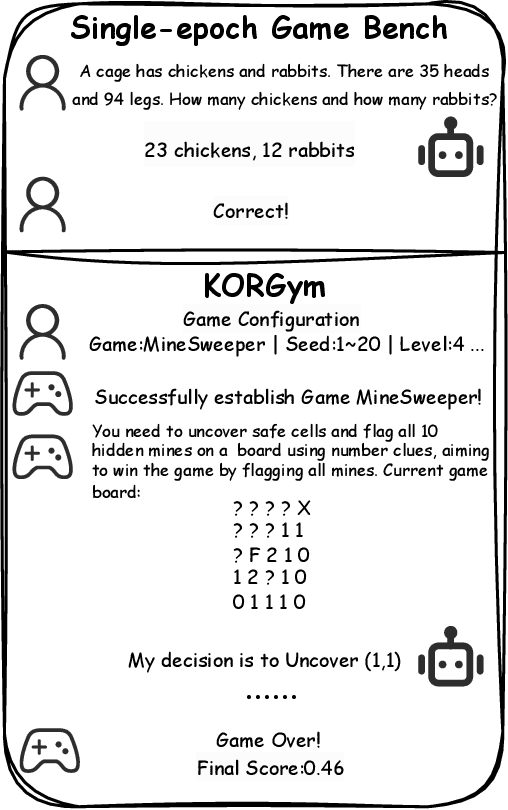
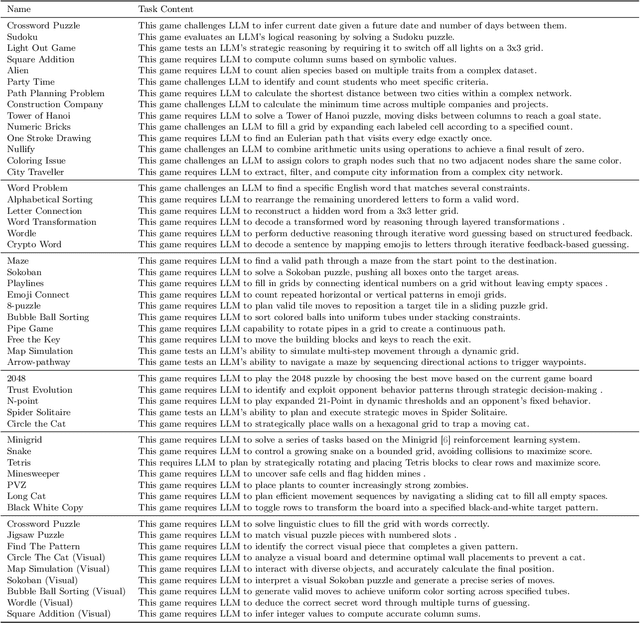
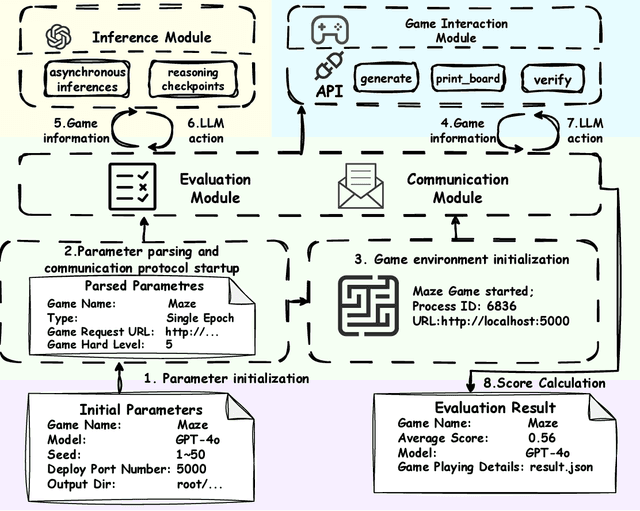

Abstract:Recent advancements in large language models (LLMs) underscore the need for more comprehensive evaluation methods to accurately assess their reasoning capabilities. Existing benchmarks are often domain-specific and thus cannot fully capture an LLM's general reasoning potential. To address this limitation, we introduce the Knowledge Orthogonal Reasoning Gymnasium (KORGym), a dynamic evaluation platform inspired by KOR-Bench and Gymnasium. KORGym offers over fifty games in either textual or visual formats and supports interactive, multi-turn assessments with reinforcement learning scenarios. Using KORGym, we conduct extensive experiments on 19 LLMs and 8 VLMs, revealing consistent reasoning patterns within model families and demonstrating the superior performance of closed-source models. Further analysis examines the effects of modality, reasoning strategies, reinforcement learning techniques, and response length on model performance. We expect KORGym to become a valuable resource for advancing LLM reasoning research and developing evaluation methodologies suited to complex, interactive environments.
Order Doesn't Matter, But Reasoning Does: Training LLMs with Order-Centric Augmentation
Feb 27, 2025



Abstract:Logical reasoning is essential for large language models (LLMs) to ensure accurate and coherent inference. However, LLMs struggle with reasoning order variations and fail to generalize across logically equivalent transformations. LLMs often rely on fixed sequential patterns rather than true logical understanding. To address this issue, we introduce an order-centric data augmentation framework based on commutativity in logical reasoning. We first randomly shuffle independent premises to introduce condition order augmentation. For reasoning steps, we construct a directed acyclic graph (DAG) to model dependencies between steps, which allows us to identify valid reorderings of steps while preserving logical correctness. By leveraging order-centric augmentations, models can develop a more flexible and generalized reasoning process. Finally, we conduct extensive experiments across multiple logical reasoning benchmarks, demonstrating that our method significantly enhances LLMs' reasoning performance and adaptability to diverse logical structures. We release our codes and augmented data in https://anonymous.4open.science/r/Order-Centric-Data-Augmentation-822C/.
Order Matters: Investigate the Position Bias in Multi-constraint Instruction Following
Feb 24, 2025



Abstract:Real-world instructions with multiple constraints pose a significant challenge to existing large language models (LLMs). An observation is that the LLMs exhibit dramatic performance fluctuation when disturbing the order of the incorporated constraints. Yet, none of the existing works has systematically investigated this position bias problem in the field of multi-constraint instruction following. To bridge this gap, we design a probing task where we quantitatively measure the difficulty distribution of the constraints by a novel Difficulty Distribution Index (CDDI). Through the experimental results, we find that LLMs are more performant when presented with the constraints in a ``hard-to-easy'' order. This preference can be generalized to LLMs with different architecture or different sizes of parameters. Additionally, we conduct an explanation study, providing an intuitive insight into the correlation between the LLM's attention and constraint orders. Our code and dataset are publicly available at https://github.com/meowpass/PBIF.
Application of machine learning algorithm in temperature field reconstruction
Feb 18, 2025Abstract:This study focuses on the stratification patterns and dynamic evolution of reservoir water temperatures, aiming to estimate and reconstruct the temperature field using limited and noisy local measurement data. Due to complex measurement environments and technical limitations, obtaining complete temperature information for reservoirs is highly challenging. Therefore, accurately reconstructing the temperature field from a small number of local data points has become a critical scientific issue. To address this, the study employs Proper Orthogonal Decomposition (POD) and sparse representation methods to reconstruct the temperature field based on temperature data from a limited number of local measurement points. The results indicate that satisfactory reconstruction can be achieved when the number of POD basis functions is set to 2 and the number of measurement points is 10. Under different water intake depths, the reconstruction errors of both POD and sparse representation methods remain stable at around 0.15, fully validating the effectiveness of these methods in reconstructing the temperature field based on limited local temperature data. Additionally, the study further explores the distribution characteristics of reconstruction errors for POD and sparse representation methods under different water level intervals, analyzing the optimal measurement point layout scheme and potential limitations of the reconstruction methods in this case. This research not only effectively reduces measurement costs and computational resource consumption but also provides a new technical approach for reservoir temperature analysis, holding significant theoretical and practical importance.
Step-by-Step Mastery: Enhancing Soft Constraint Following Ability of Large Language Models
Jan 09, 2025Abstract:It is crucial for large language models (LLMs) to follow instructions that involve multiple constraints. However, soft constraints are semantically related and difficult to verify through automated methods. These constraints remain a significant challenge for LLMs. To enhance the ability of LLMs to follow soft constraints, we initially design a pipeline to obtain high-quality outputs automatically. Additionally, to fully utilize the acquired data, we introduce a training paradigm based on curriculum learning. We experimentally evaluate the effectiveness of our methods in improving LLMs' soft constraint following ability and analyze the factors driving the improvements. The datasets and code are publicly available at https://github.com/Rainier-rq/FollowSoftConstraints.
QUILL: Quotation Generation Enhancement of Large Language Models
Nov 06, 2024



Abstract:While Large language models (LLMs) have become excellent writing assistants, they still struggle with quotation generation. This is because they either hallucinate when providing factual quotations or fail to provide quotes that exceed human expectations. To bridge the gap, we systematically study how to evaluate and improve LLMs' performance in quotation generation tasks. We first establish a holistic and automatic evaluation system for quotation generation task, which consists of five criteria each with corresponding automatic metric. To improve the LLMs' quotation generation abilities, we construct a bilingual knowledge base that is broad in scope and rich in dimensions, containing up to 32,022 quotes. Moreover, guided by our critiria, we further design a quotation-specific metric to rerank the retrieved quotations from the knowledge base. Extensive experiments show that our metrics strongly correlate with human preferences. Existing LLMs struggle to generate desired quotes, but our quotation knowledge base and reranking metric help narrow this gap. Our dataset and code are publicly available at https://github.com/GraceXiaoo/QUILL.
 Add to Chrome
Add to Chrome Add to Firefox
Add to Firefox Add to Edge
Add to Edge